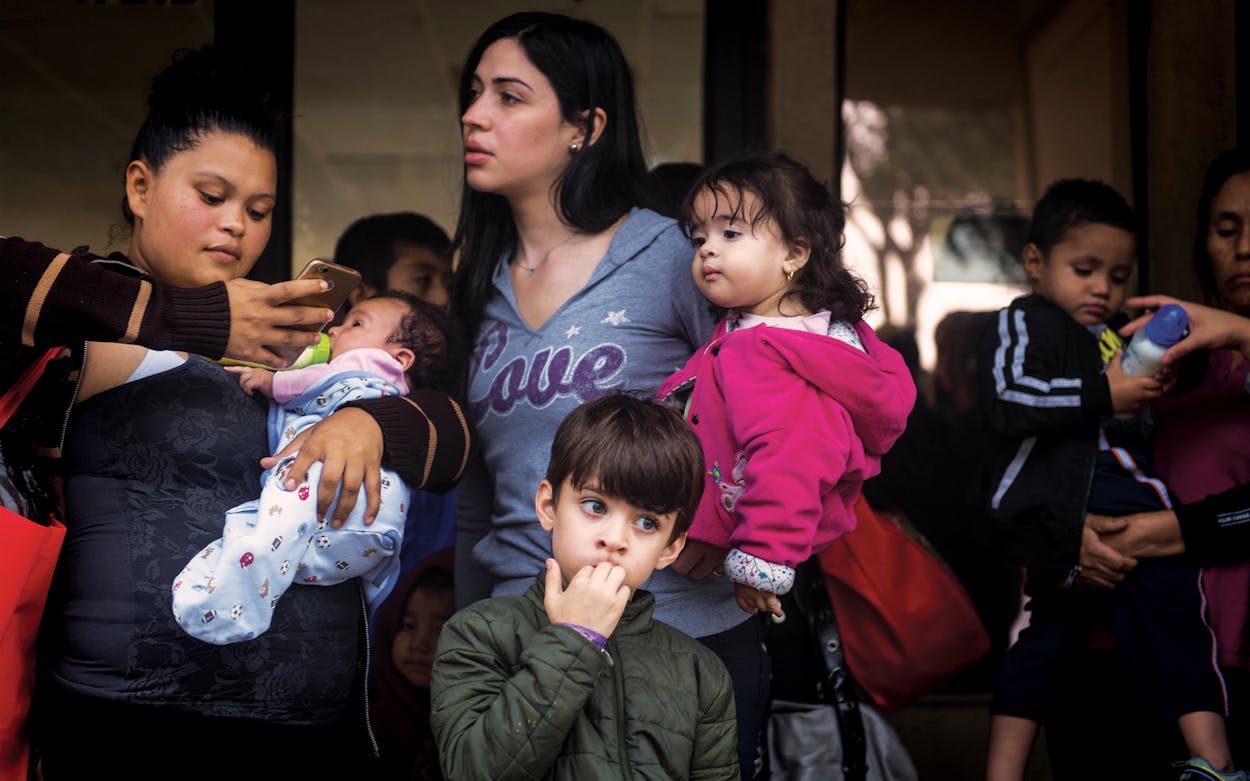Less than two weeks before the midterm elections, an escalation of Trump administration policies along the border is resulting in a renewed focus on the hot button issue of border security. Administration officials announced on Thursday the deployment of at least 800 U.S. Army troops to the border ostensibly to head off a caravan of Central Americans headed to the United States. On Thursday evening came news that the president is considering an executive order that would shut off the southern border to any immigrant in that caravan. And now, immigrant advocacy groups along the Texas-Mexican border are saying that border agents are stepping up the pace in which immigrant families are being released into the United States.
One immigrant advocate said he fears that if nonprofits and other nongovernmental organizations, or so-called NGOs, cannot accommodate the volume of immigrants being released that the families will be left on the streets of border communities. The advocate said this could be the beginning of a manufactured humanitarian crisis ahead of polling.
“After processing families, Border Patrol, Customs and Border Protection and Immigration and Customs Enforcement will no longer hold families in holding cells for time periods beyond what court orders allow them to hold families with children,” said Ruben Garcia, founder and director of El Paso’s Annunciation House. Courts have said families cannot be detained more than 72 hours. But immigrants being served by Annunciation House have said that immigration authorities often move families from one facility to another to circumvent that rule. In some cases, immigrants have said they have been held up to ten days in holding facilities.
“If there are no (nongovernmental organizations or NGOs), churches, or shelters able and willing to receive the families, they will be released to the street,” Garcia said. “In addition, Border Patrol and CBP will no longer assist families in contacting relatives or friends to have them get bus or plane tickets nor will they transport families to bus stations or airports. Those functions will be left to NGOs, churches or shelters.”
Sister Norma Pimentel, executive director of the Catholic Charities of the Rio Grande Valley, which oversees the Humanitarian Respite Center, said that mass releases have already begun in South Texas. She said her group is handling as many as 500 people a day and they have begun transporting those they cannot accommodate in downtown McAllen to the Basilica of our Lady of San Juan del Valle, a revered Catholic sanctuary that can hold up to 1,800 people, which is near McAllen. She said she has begun discussions with McAllen city officials about setting up tents in McAllen to accommodate more immigrants.
ICE declined to comment on the policy change beyond a written statement from Deputy Press Secretary Sarah Rodriguez: “After decades of inaction by Congress, the government remains severely constrained in its ability to detain and promptly remove families with no legal basis to remain in the U.S. As a result, family units continue to cross the border at high volumes and are likely to continue to do so, as they face no consequence for their actions. To mitigate the risk of holding family units past the timeframe allotted to the government, ICE began curtailing all reviews of post-release plans from families apprehended along the southwest border starting on Tuesday, October 23. Family units that are released will be enrolled in a form of ICE’s Alternatives to Detention or released on another form of supervision. Aliens will be issued a Notice to Appear in immigration court, as appropriate. ICE continues to work with local and state officials and NGO partners in the area so they are prepared to provide assistance with transportation or other services.”
Although total apprehensions of undocumented immigrants at the Mexican border remain near historic lows, the numbers of Central American families crossing the border have increased in recent months, particularly after the Trump administration ended its controversial family separation policy. CBP officials announced this week that 16,658 members of family units were apprehended at the Southwest border in September, the highest monthly total on record. Annunciation House earlier this week began renting out two El Paso motels to house and feed migrants after they are released from CBP custody. The agency has long run a network of church-based shelters where released migrants stay for a day or two before moving on to join family members elsewhere in the United States while their asylum cases are decided in immigration court—at no cost to the government. The motel rooms increased Annunciation House’s capacity from 700 to about 1,100, but it’s not enough to meet current needs.
“This morning I got a text from Border Patrol headquarters saying that right now they’ve got 1,500 people in their holding cells and they just finished detaining a group of 179 people. This week we will have received 1,300 hundred people and so they’re asking can we ramp up even beyond 1,300, which we want to do, but it’s really, really challenging to do that,” Garcia said.
Garcia said Annunciation House should be able to ramp up its bed space to handle up to 1,600 migrants per week, which should meet the immediate need in the El Paso area. But he said other border communities lack the infrastructure that Annunciation House provides in El Paso, meaning local communities could have to shelter and feed hundreds or thousands of families suddenly released on their streets.
- More About:
- Donald Trump






